Pacific Rim is a 2013 movie about robots that hit each other. Mako Mori (played by Rinko Kikuchi) is some glitzy two-dimensional "for my famiri" dame notable for being a heroine without a germanic-sounding last name. Her bob cut and piano black tit armor makes her look like a less sexy Yayoi Kusama as she grunts and stabs her way through waves of baddies. Near the end of the movie while debating a glistening Ken doll cum tribute lookalike(Charlie Hunnam) on the reasons to fight she says "It's not obedience Mr Becket, it's respect" which is a perenium-tighteningly embarrassing quote. Other than my shambolic expectations for a hollywood movie a deferential vaguely oriental character isn't terribly surprising. Like the indian headband there's a rather careless disparity between how groups see themselves and what their reflections turn into in the cogs of the entertainment machine. At least having a Japanese national kill people while thinking of their families is historically accurate, something ultraman stan del toro depicted very well. Right now there's a curious political bisection happening in Japan. Namely what kind of reflection people see themselves in the Russo-Ukranian war.
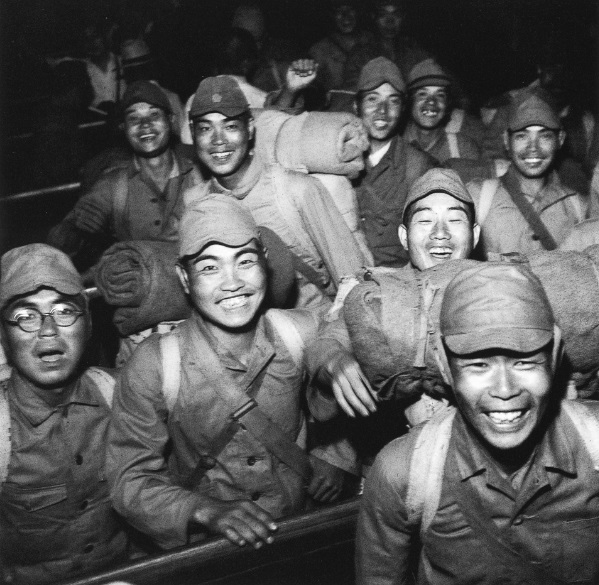 Repatriated IJA soldiers at Shinagawa Station. Tokyo 1946. Hayashi Tadahiko
Repatriated IJA soldiers at Shinagawa Station. Tokyo 1946. Hayashi TadahikoHistory
Agreed history is an oxymoron in Japan. The fundamental roadblock to any commonly agreed narrative is that these arguments are without an authority - Japan's academic elite have long taken on a non-antagonistic stance with the state, itself built on fresh 19th century narratives of invented nationalism. Accordingly, institutional and academic influence on public consensus has faltered in the face of work by journalists: some revealing like Seiichi Morimura, others proudly advertising their lack of scholarly rigor. As Wages of Guilt states, even the study of contemporary Japanese history is a staggeringly larval invention:
the debate on the Japanese war is conducted almost entirely outside Japanese universities, by journalists, amateur historians, political columnists, civil rights activists, and so forth. This means that the zanier theories of the likes of Tanaka Masaaki are never seriously contested by professional historians...modern history was not considered academically respectable. It was too fluid, too political, too controversial. Until 1955, there was not one modern historian on the staff of Tokyo University. History stopped around the middle of the nineteenth century. And even now, modern history is considered by senior historians to be something best left to journalists.
This disparity between academics and media ghouls in capturing the public's attention isn't limited to just history. In 2013 the prestigious newspaper Asahi Shimbun published a dubious headliner claiming the HPV vaccine carried health risks. The resulting paper you wouldn't bother wiping an orifice with has culminated in a 0.7% vaccination rate and 3000 extra deaths annually among women. As a result of this constant soul-searching narratives ebb and sway, not beholden to common conclusions or authoritative figures spearheading public opinion. This all came to ahead when the Ukrainian government included the Showa emperor Hirohito in a bit of anti-fascist anti-putin propaganda. The resulting backlash from people who have too much time on their hands led to a staggering rescindance and apology from the Ukrainians, an outcome more embarrassing than pissing your pants. A man so quietly unpopular even to the "colonialism was epic" crowd was suddenly defended online by right-wingers like he was a corporate billionaire, all by virtue of a foreign entity criticizing monarchy.
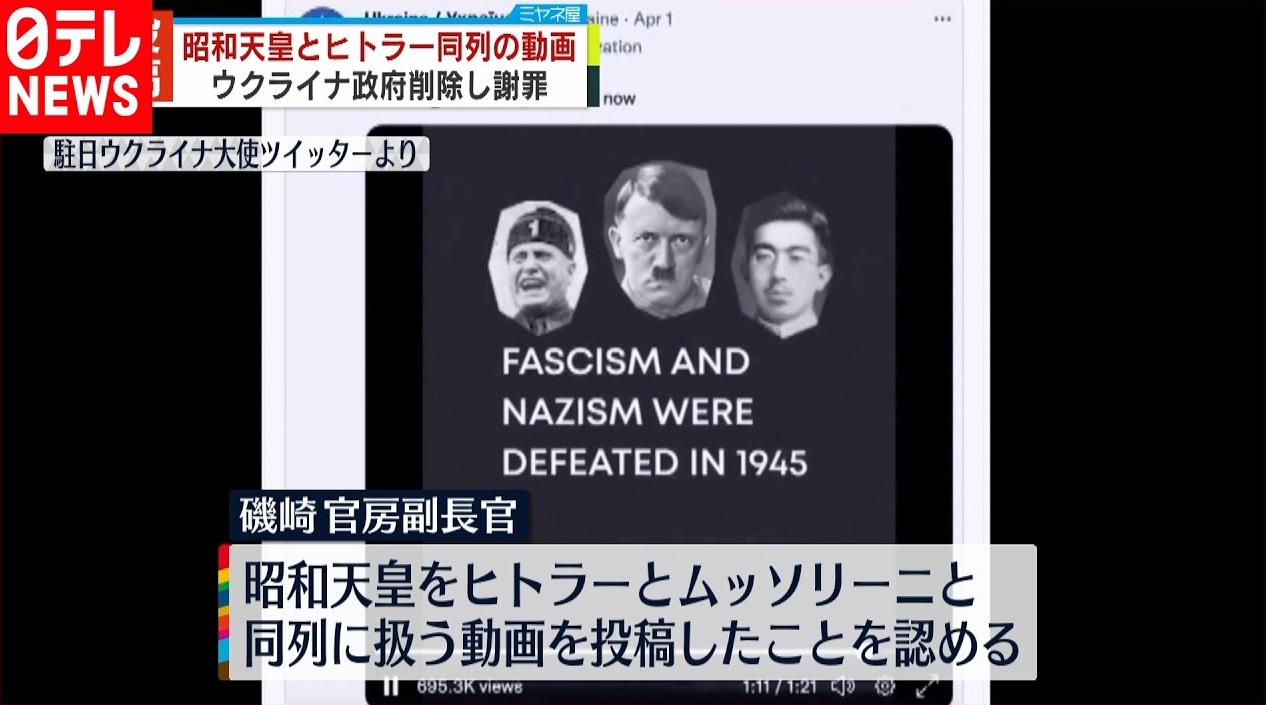
More cynical Japanese eyes saw themselves not as Ukranians whose sovereignty is continually threatened by a larger regional rival, but as Russians. The fervent support for the war by those not fighting it, the enthusiastic media support, obscured casualty figures, the dissidents disappearing, it all was a mirror image of was happening in 1937. To them nodding along to a pyrrhic conflict is more Japanese than soup from vending machines or dying alone. News of the Kishida administration doubling defense spending in response was the very last outcome they wanted with their fundamental belief that the Japanese state doesn't have a great record in responsible state violence. You wonder what the over-70's in Japan must feel, clicking through "wounded Russian soldier shoots himself" compilations on twitter or the daily pictures of Gazan children reduced into scoopable pieces. They rioted in their 20's with the conviction that they could change the world, only to see the same images and hear the same stories.
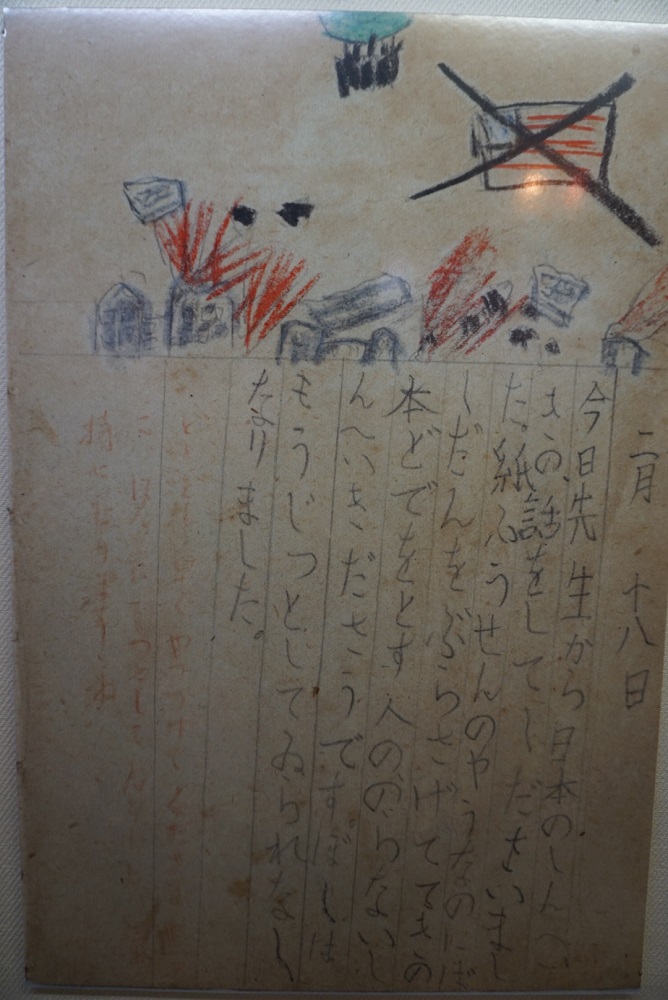 February 18th, 1945 Today the teacher told us about the army's new weapons. Apparently they're like paper balloons with a bomb suspended on it. It's used to destroy Japan's enemies. I feel like I can't sit here idly anymore. - class essay written by a 2nd grader, Rissei Elementary, Kyoto
February 18th, 1945 Today the teacher told us about the army's new weapons. Apparently they're like paper balloons with a bomb suspended on it. It's used to destroy Japan's enemies. I feel like I can't sit here idly anymore. - class essay written by a 2nd grader, Rissei Elementary, Kyoto
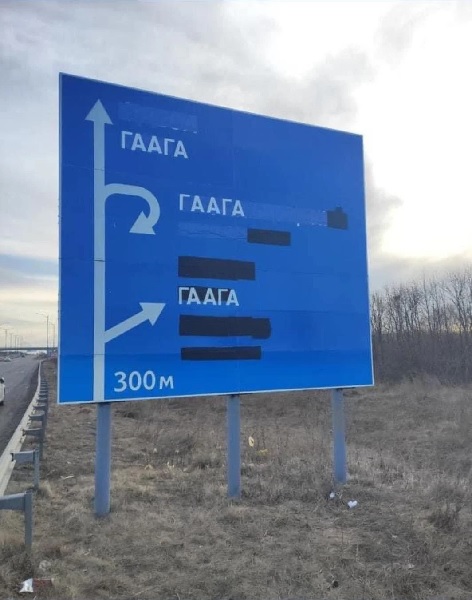
State Pacifism
Article 9, an element of the Japanese constitution written up by SCAP during American occupation states, "Aspiring sincerely to an international peace based on justice and order, the Japanese people forever renounce war as a sovereign right of the nation and the threat or use of force as means of settling international disputes...The right of belligerency of the state will not be recognized." It served to dial back the military as an independent state institution, one that during wartime kicked off numerous internal clashes with the imperial government and killed millions in the Pacific. Revered physician Tetsu Nakamura was one of the most vocal proponents of Japan state pacifism, stating:
"Forgo the use of weapons and institutionalize pacifism. Article 9 guarantees the tangible existence of a pacifist state. The people here understand this. It's the reason why successive Afghan governments, anti-government militias, and the Taliban have never impeded our work here. (Article 9) protects us...This is Japan's true strength.
Nakamura had provided aid to thousands of civilians across 35 years in Afghanistan, first during the Soviet Invasion, through the numerous civil wars that followed, and the American Invasion. When he was killed in 2019 he was given a state funeral by the Afghan government, Ashraf Ghani being among the pallbearers during his repatriation. His Japanese counterpart experimental Anpanman-mandrake hybrid PM Shinzo Abe didn't attend, a man whose war criminal grandfather was rehabilitated by the American occupation. (generally people with the nickname "Monster of the Shōwa era" don't become prime minister)
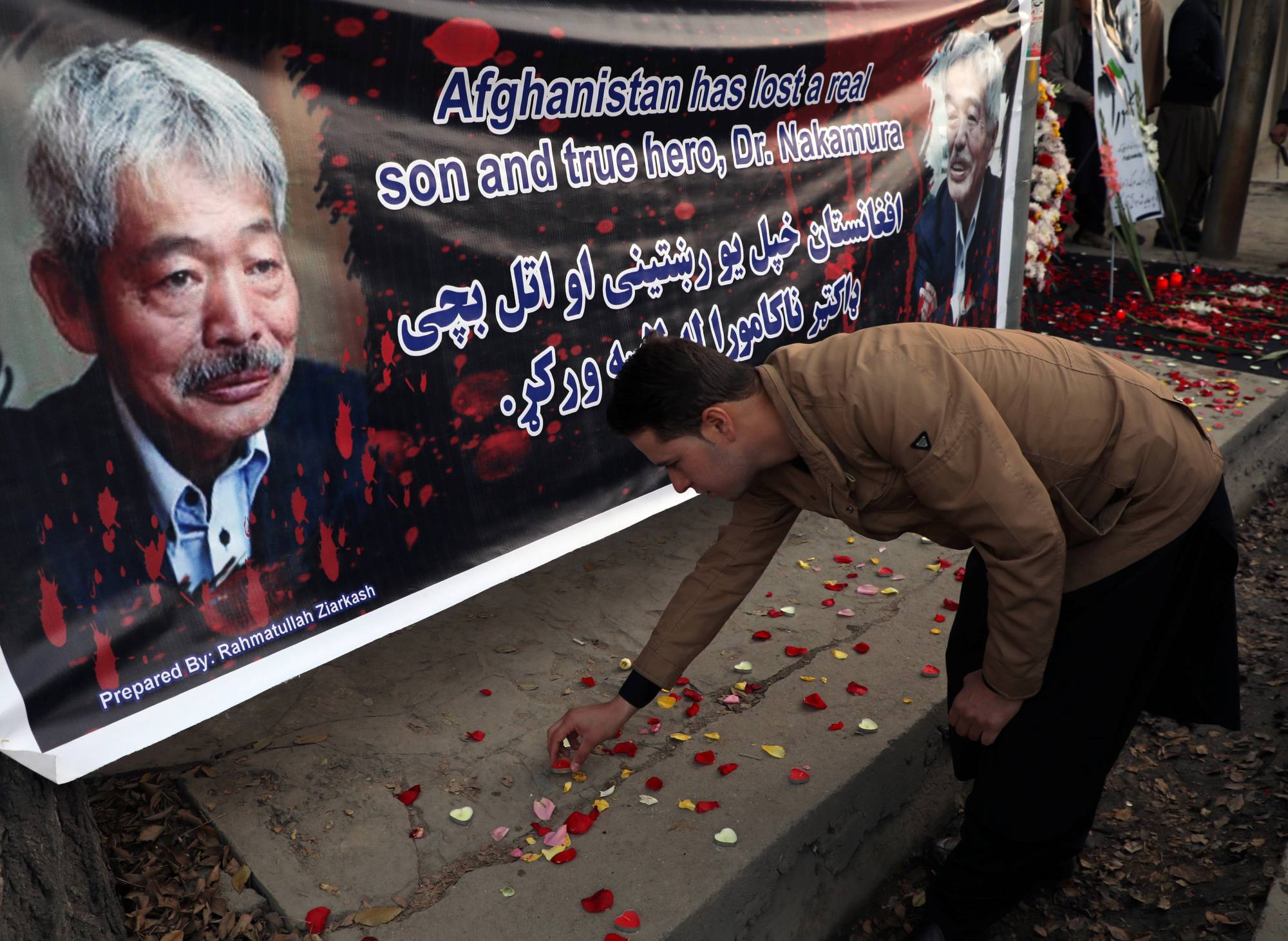
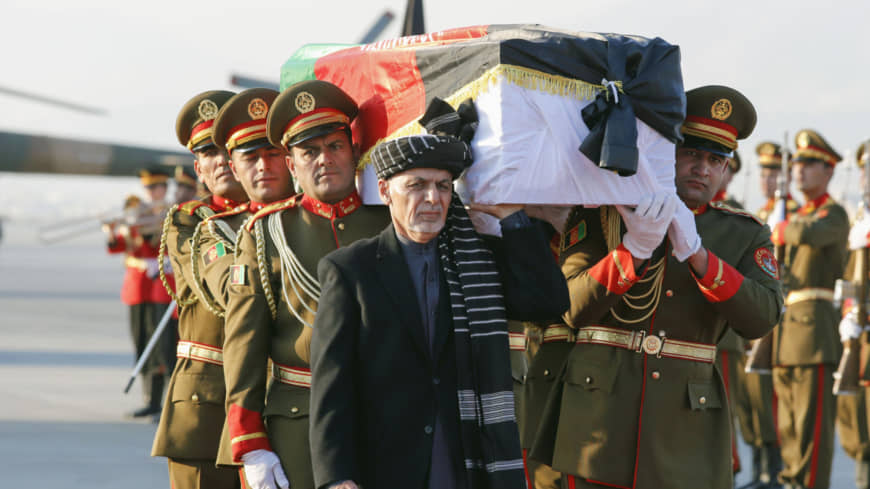
And even during the post-war Japanese constitution's drafting the US' own agenda in the Pacific thoroughly muddled the ideological purity of a new pacifist democratic state. Internally there was a reshuffling of SCAP reconstruction officials and with Willoughby at its helm the attempt to reign in those responsible for Imperial Japan's trajectory turned into active cooperation with ultranationalists. The occupation's moves to unban and promote labor unions at a time when a national famine was a possibility was suspended by 1947. The February general strike of the same year was suppressed by the MacArthur administration, with successive labor disputes in factories and mines lent support from would-be-hanged figures like Yoshio Kodama mobilizing the Yakuza as strikebreakers. (The japanese release of David Kaplan's 1986 book on the Yakuza's history was successfully suppressed by right-wing power broker Ryoichi Sasakawa, another former war criminal rehabilitated by SCAP) Kodama would later serve as a G-2 agent smuggling Chinese tungsten for the US and Lockheed consultant covertly persuading the government to procure F-104 and L-1011 aircraft, culminating in a global bribery scandal. Such a hand-in-hand US response with the kind of ultranationalist leaders being hanged in Sugamo was born out a fear of a communist revolution, one with plenty of West German equivalents like Hans Globke or Klaus Barbie.
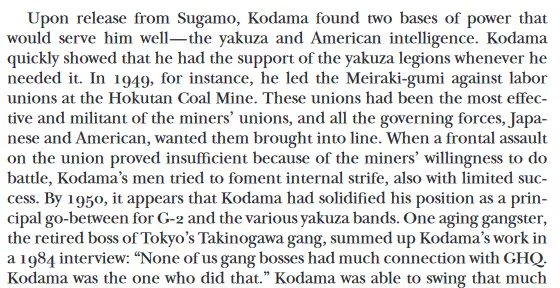 Yakuza: Japan's Criminal Underworld (1987)
Yakuza: Japan's Criminal Underworld (1987) Nippon: New Superpower (1990)
Nippon: New Superpower (1990)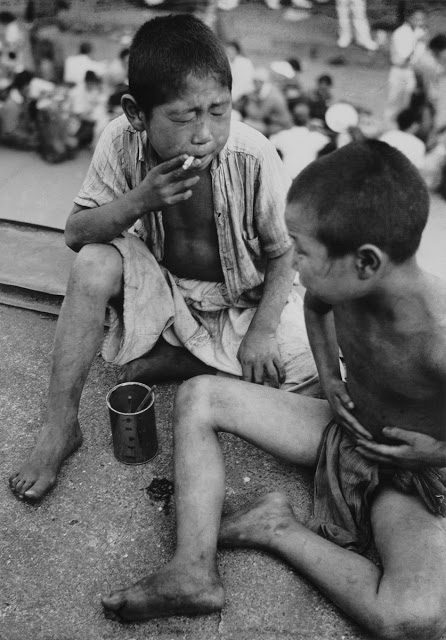 Street children smoking. Ueno, Tokyo 1946. Hayashi Tadahiko
Street children smoking. Ueno, Tokyo 1946. Hayashi Tadahiko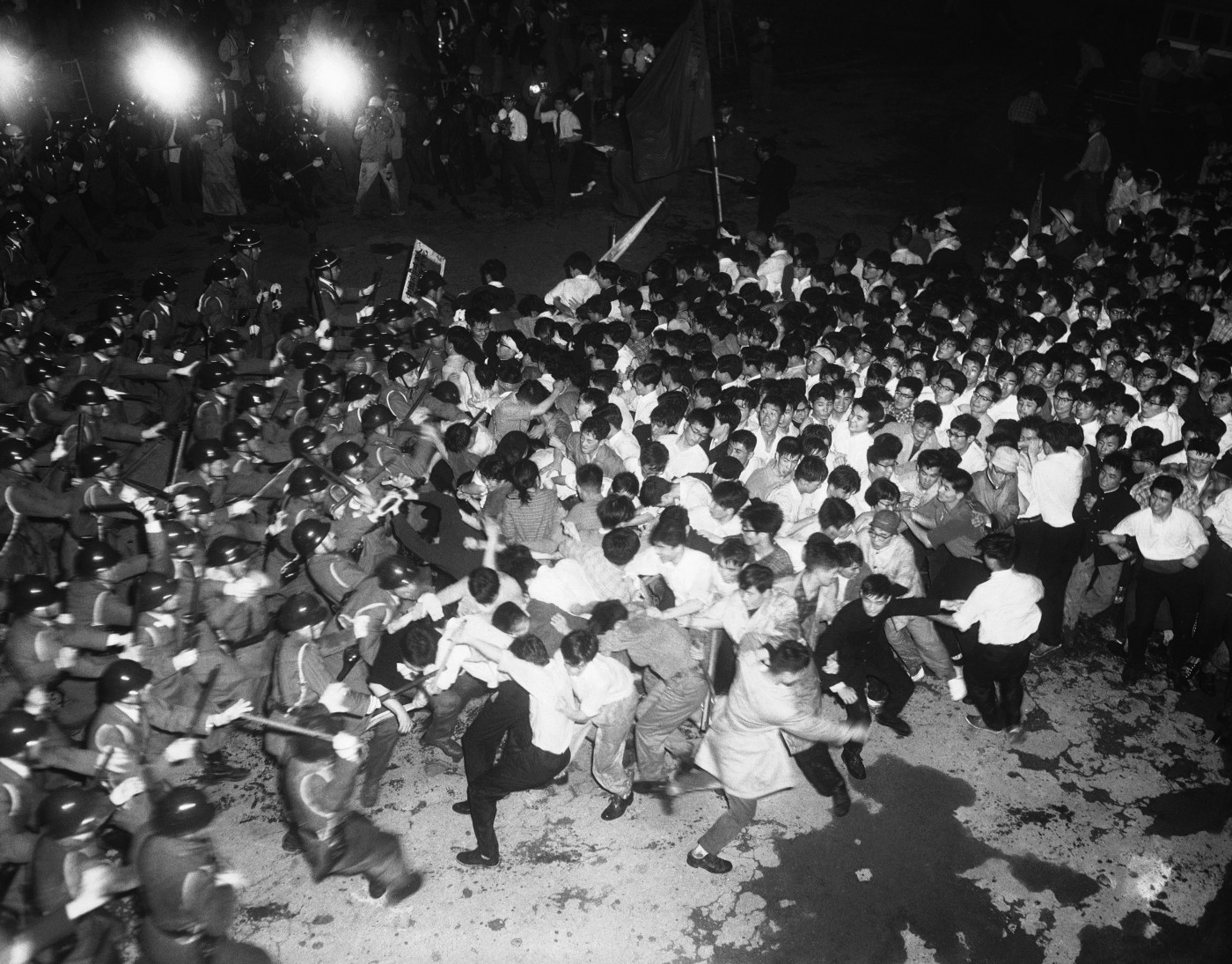 Zengakuren and police clash outside Parliament in Tokyo during protests against pro-American Prime Minister Nobusuke Kishi. June 1960
Zengakuren and police clash outside Parliament in Tokyo during protests against pro-American Prime Minister Nobusuke Kishi. June 1960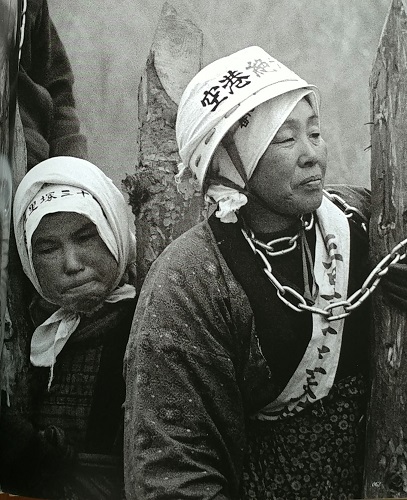 Farmers chain themselves to trees during the Sanrizuka Struggle. Chiba 1971
Farmers chain themselves to trees during the Sanrizuka Struggle. Chiba 19713 years after the new constitution was introduced the Korean war demonstrated its ideological flexibility in practice with the Yoshida government enthusiastically sending minesweepers and providing logistics to US and UN troops. Evidently that wasn't enough and in 1952 Masanobu Tsuji, a former IJA officer turned CIA spy was among a group groomed by G-2 chief Willoughby to assassinate Yoshida for a more hawkish pro-US prime minister. The CIA report characterizes him as "extremely irresponsible" and "the type of man who, given the chance, would start World War III without any misgivings." At this time SCAP officials fearing a weak economy and widespread labor protests stated "Korea came along and saved us". It was the well-needed pretext to disregard earlier reforms and raise a new army, staffed with thousands of veterans from the war. Like West German leftist reactions to the Adenauer government suspending denazification, much of the Japanese opposition's rhetoric drew unsavory parallels to previous governments. Activists went directly to Mitsubishi shipyards to appeal to Zainichi Korean day laborers, student protests in Tachikawa successfully suspended the airbase's expansion. The predictable American-Japanese response had protesters arrested under Ordinance No. 311 (acts prejudicial to the objectives of the Allied Occupation Forces) and handed lengthy sentences including deportation of Zainichi-Japanese nationals back to war-torn Korea, which produced a deeply ironic question among the Japanese. In actualizing the constitution's pacifism that the Americans themselves had written people were subject to the same punishments as dissidents under Imperial Japan.
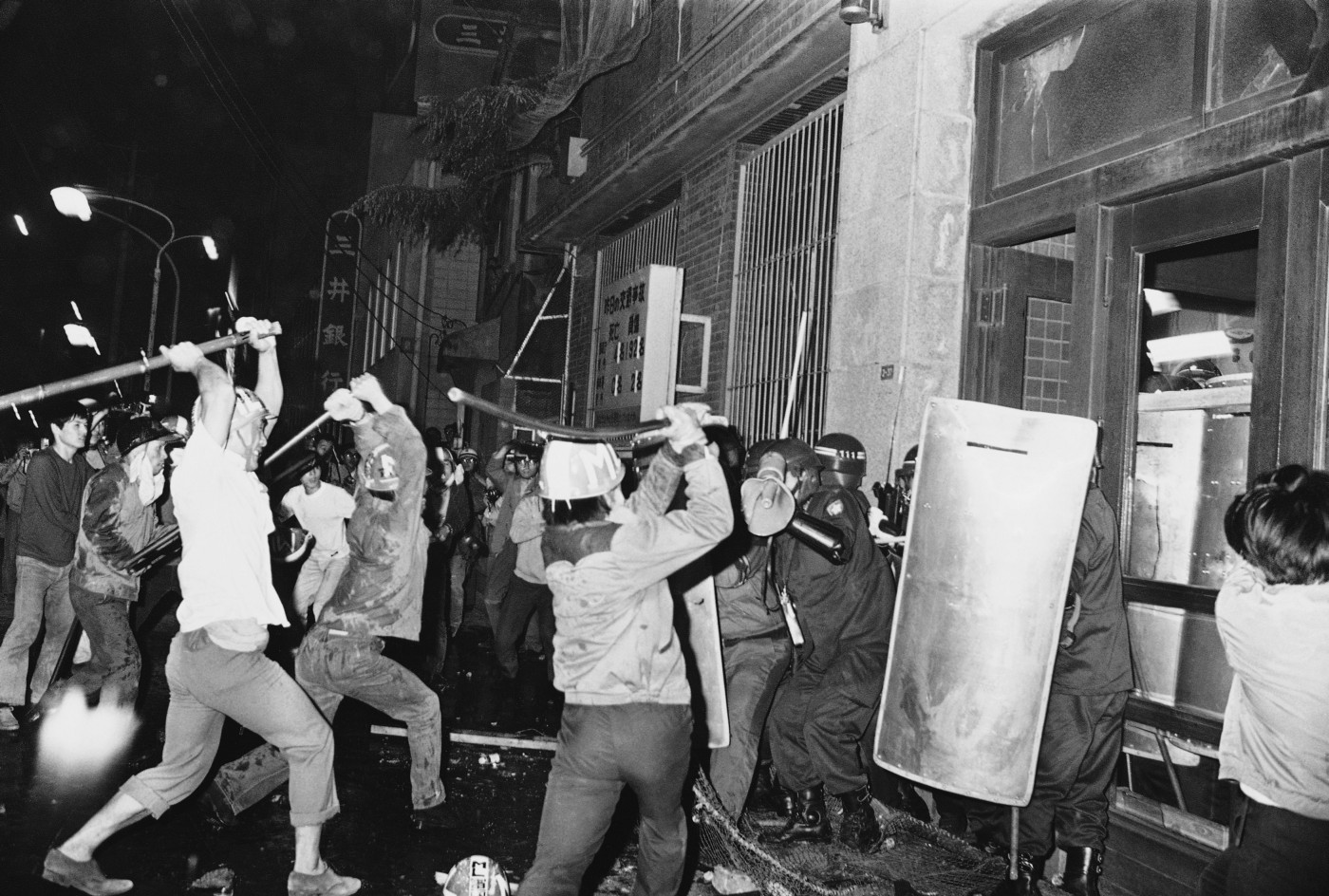 Radical student demonstrators swing iron bars at riot policemen during the second Anpo Protests. Azabu, Tokyo. Tuesday, June 23, 1970.
Radical student demonstrators swing iron bars at riot policemen during the second Anpo Protests. Azabu, Tokyo. Tuesday, June 23, 1970. 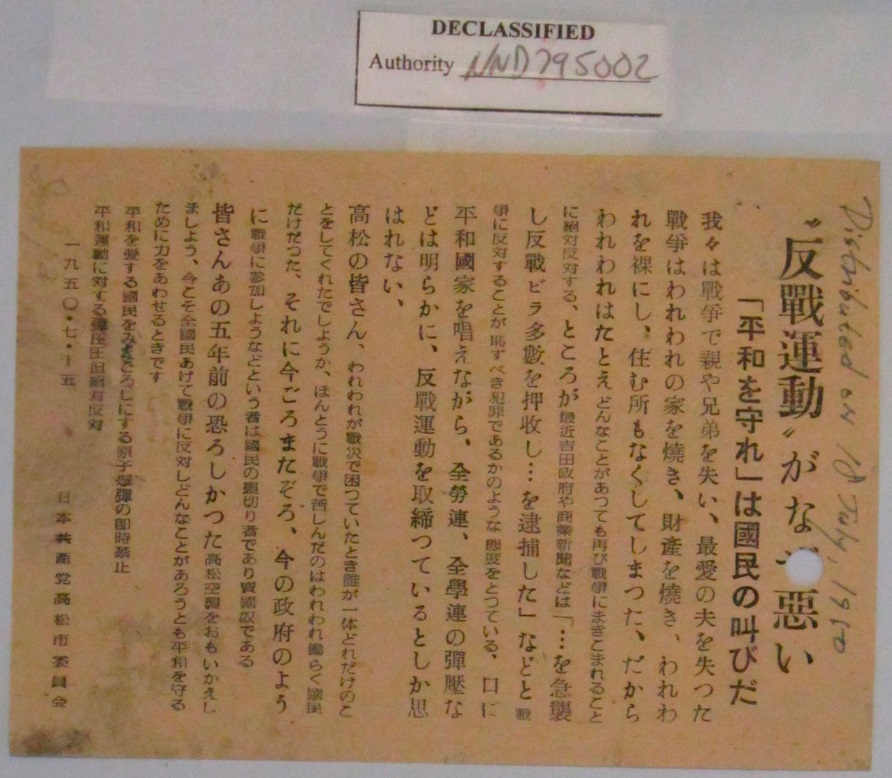 Japanese Communist Party article "What's objectionable about being anti-war?" July 1950
Japanese Communist Party article "What's objectionable about being anti-war?" July 1950In the Vietnam war Japan became a vital Pacific airfield for the US, dramatically stepping up activity and transforming airbases formerly taking on passive duties in the cold war. The aircraft at Yokota airbase went from Cold-War deterrent SAC bombers and reconnaissance aircraft to F-105 and F4's departing directly to Vietnam. Jets regularly crash-landed in Japanese suburbs which served as a reminder that their support didn't happen in a vacuum. Like the Korean war Japanese Keiretsus largely untouched by the American occupation like Mitsui(who sold opium-laced cigarettes in Manchuria) and Mitsubishi Heavy Industries(who extensively used Korean slave labor in domestic mines) reported record profits in supplying the war effort.
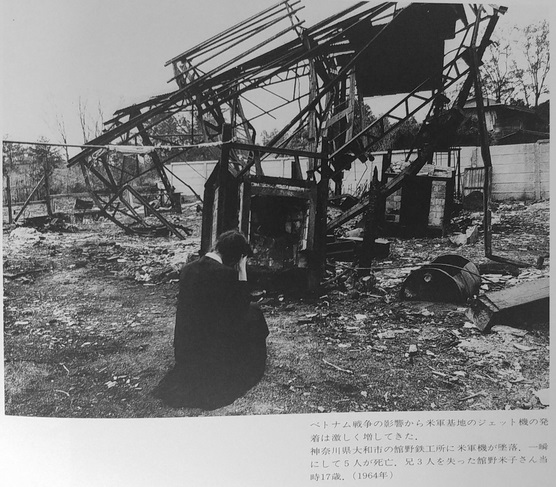 Kanno Yoneko kneels at the site of an American F-8U crash at a steel fab that killed 5 including 3 of her brothers. Kamisouyagi, Kanagawa Prefecture. 1964. Hamaguchi Takashi
Kanno Yoneko kneels at the site of an American F-8U crash at a steel fab that killed 5 including 3 of her brothers. Kamisouyagi, Kanagawa Prefecture. 1964. Hamaguchi Takashi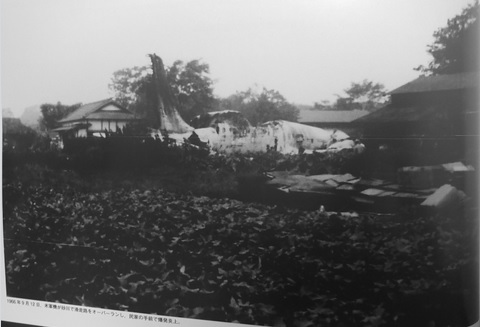 Remains of an American aircraft that had overrun the airfield and exploded next to residential houses. Sunagawa, Tokyo. September 1966
Remains of an American aircraft that had overrun the airfield and exploded next to residential houses. Sunagawa, Tokyo. September 1966 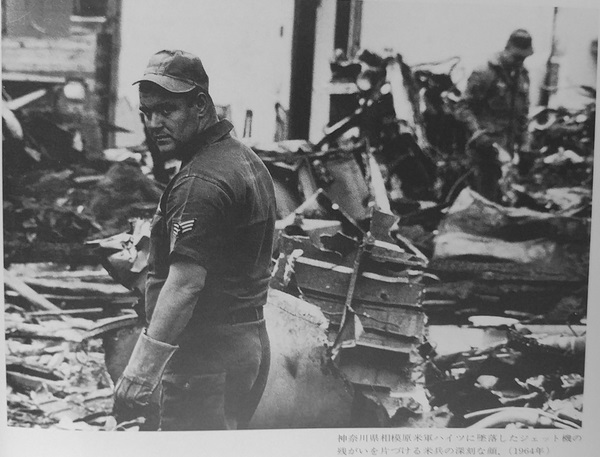 An American soldier picks through rubble after an aircraft crash lands into a residential mansion. Sagamihara, Kanagawa prefecture. 1964. Hamaguchi Takashi
An American soldier picks through rubble after an aircraft crash lands into a residential mansion. Sagamihara, Kanagawa prefecture. 1964. Hamaguchi Takashi This policy transition would also have impacts domestically, Robert McNamara explicitly stating that the asia experts purged during the Red Scare were absent during the labyrinth of policy failures that was the Vietnam War. The state department official who successfully implemented gender equality in the Japanese constitution was later blacklisted and never worked in public office again.

Regional Security
In the main building of the Self-Defense Agency, as nondescript inside as outside, I had an appointment with Hagi Jiro, deputy director general of the agency...I asked him about Japanese public opinion. What did most people think Japan should do about the Gulf War? He said the majority were against sending any Japanese troops. In November 1990, a special bill proposing just that had to be dropped. Most Japanese, he said, still associated the military with the old Imperial Army. But this varied from generation to generation. People with memories of World War II, he said, were very much opposed to sending Japanese soldiers to fight on any front. People between the ages of thirty and fifty felt less strongly about this. And young people could be swayed easily one way or the other by the mass media. He mentioned Article Nine of the Japanese constitution. And as so often happened in Germany, the question of trust came up. Hagi said: “The Japanese people do not trust the Self-Defense Forces because they cannot trust themselves as Japanese. This is why they need the constitution to block security efforts.”...This was, of course, what many people believed. It was what I had been taught to believe, that the Germans and Japanese were dangerous peoples, that there was something flawed in their national characters. But it was not what I had expected to hear at the defense headquarters of Japan. Linking the two nations, however, as Hagi had done, was something Germans, in my experience, tended to avoid.
The last paradox lies in Japan's own regional security interests. Broadly all major parties retain a critical view of Chinese foreign policy, from Osaka's current ultranationalist party Isshin no To to the Japanese Communist party in its Red Flag newspapers. Surveys consistently have Japanese nationals reporting the lowest approval ratings for China despite political participation remaining around 30%. With the capitalist delusion of economic isolation as a deterrence to war discarded after the Russian invasion the recent defense spending hike isn't a surprise. The irony in proclaiming a flexible and actively eroding state pacifism while paying for an American military presence is also not lost on the Japanese. And so this enduring question of regional security, always China, sometimes North Korea, and now Russia needs to accommodate the realities of nuclear conflict, a constitution that the right-wing LDP does their best to re-write, and the presence of US bases that dot the TV with questionable news in a country where car accidents and housefires get late-night coverage.
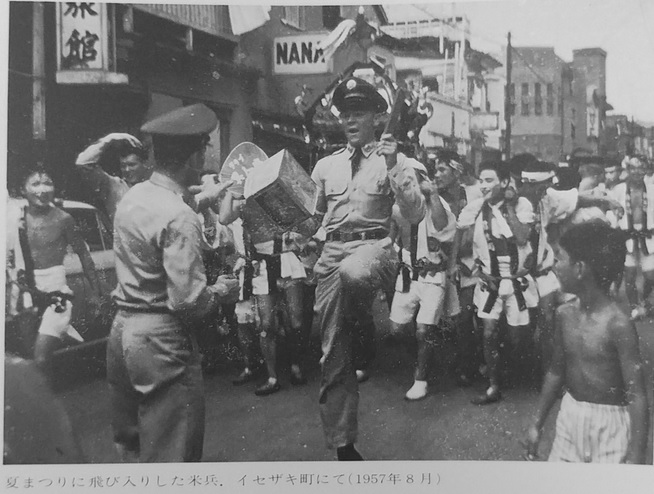 An American serviceman joins the Isezakichō summer festival. Yokohama, Kanagawa Prefecture. August 1957
An American serviceman joins the Isezakichō summer festival. Yokohama, Kanagawa Prefecture. August 1957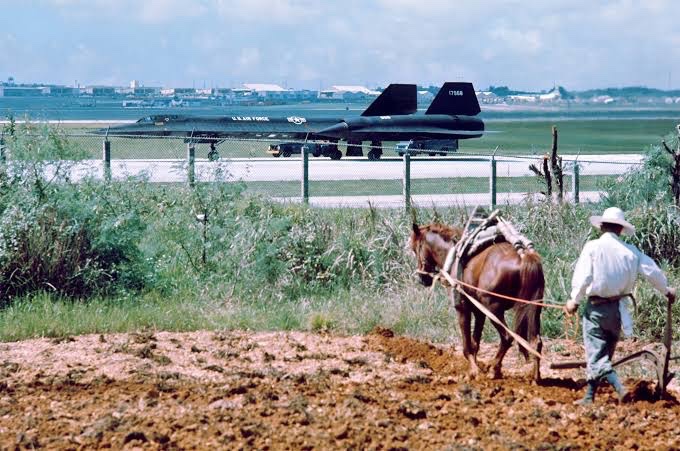 A farmer next to Kadena Airfield, 1971
A farmer next to Kadena Airfield, 1971In a country where masonry housing is explicitly illegal the geographic viability of long-term nuclear power has been a pressing question, a wound spread wide open in 2011. Like the US if the country were to continue relying on 70's energy policy funding for modernization should've happened decades ago. There's also the unsaid but transparently obvious convenience of enriching capabilities like the country's attempt at blue water force projection through the JMSDF's "helicopter" carriers. If Americans reshuffle their security assets away from Japan these nuclear sites serve as the ultraright's contingency plan for regional security. As it stands right now there's numerous aging nuclear sites in a notoriously earthquake-afflicted country with facilities vulnerable to preemptive strikes in a near-peer conflict and residents remain unwaveringly opposed to burying spent rods domestically. The developmental lead on solar panels that the Japanese abandoned in the early 2000's with recent calls for cutting back energy usage guarantees this will remain an open question for the next few years.
This country has been talking about the same 3 things for 70 years. As long as Japan's pacifism remains in this contradiction-by-convenience state the LDP's moves to nullify Article 9 will remain a national and international threat to the 70 years of uneasy peace Japan has enjoyed.
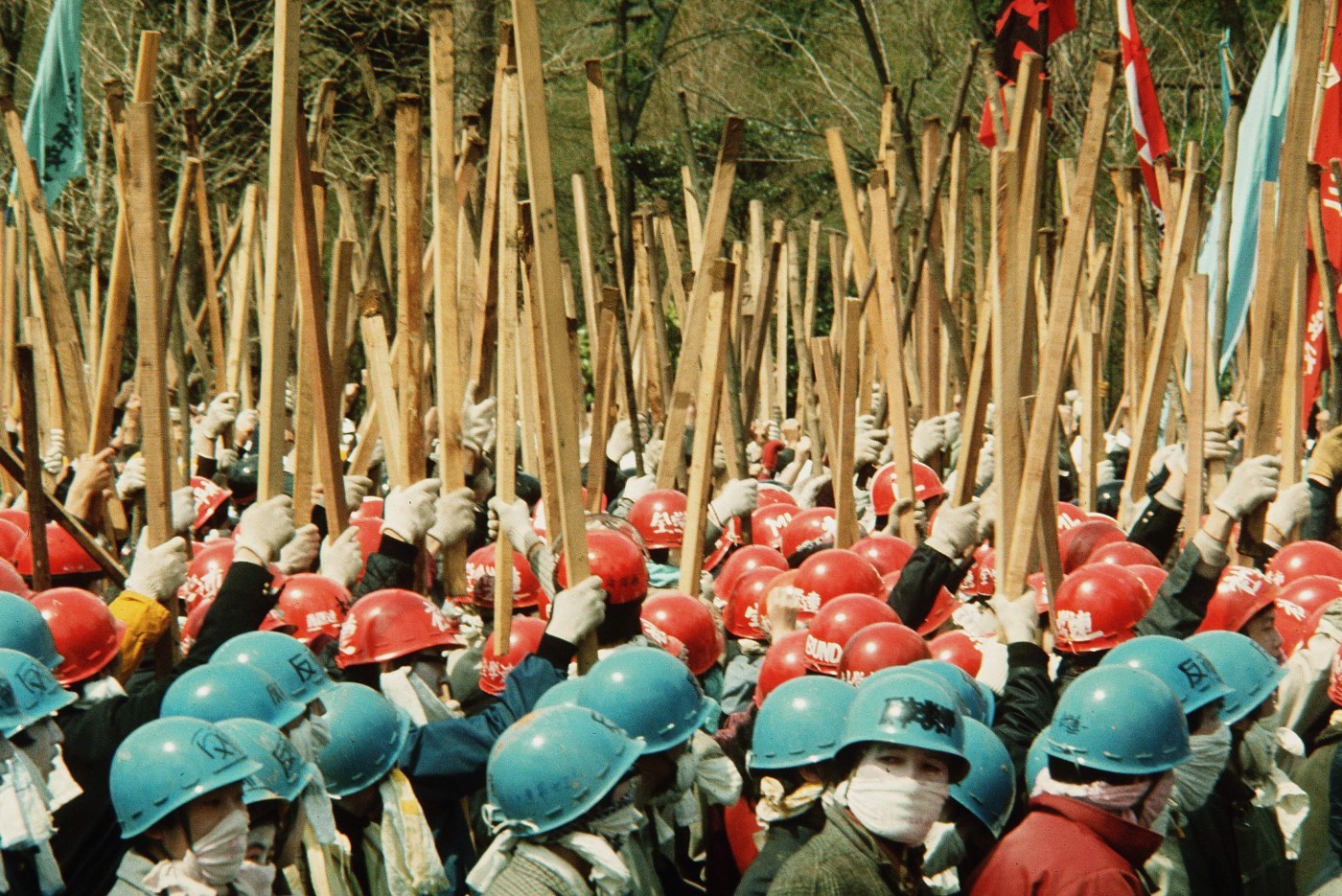 Radical left wing students protesting the construction of the New Tokyo International Airport Narita, Chiba Prefecture. March 31, 1968
Radical left wing students protesting the construction of the New Tokyo International Airport Narita, Chiba Prefecture. March 31, 1968 6/23/2022
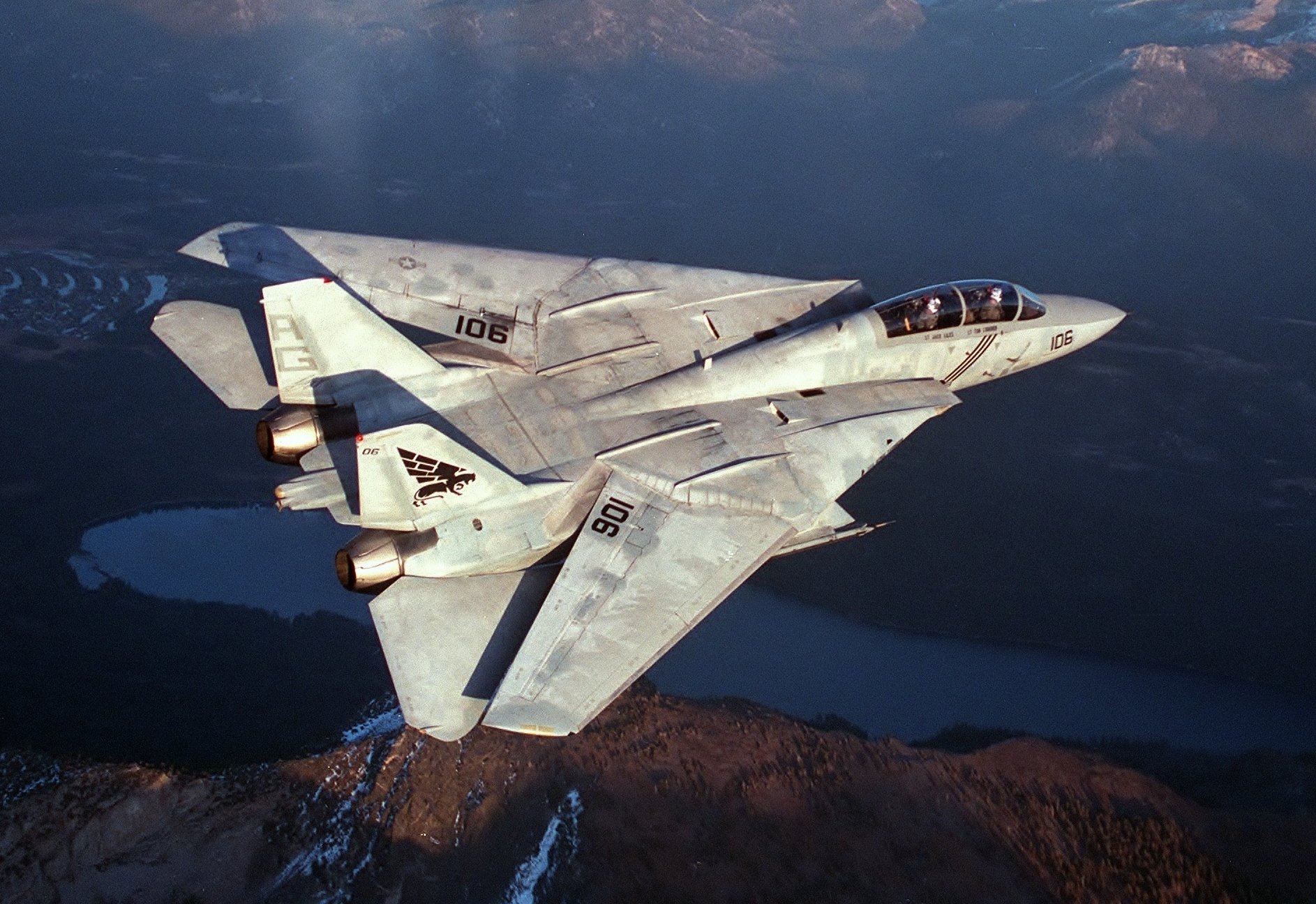
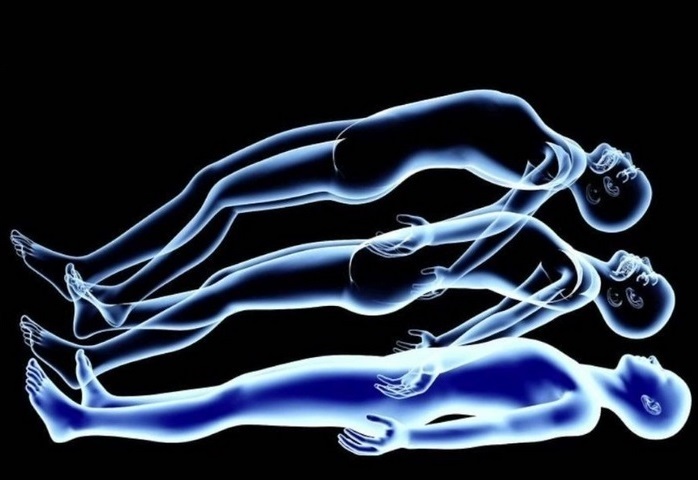

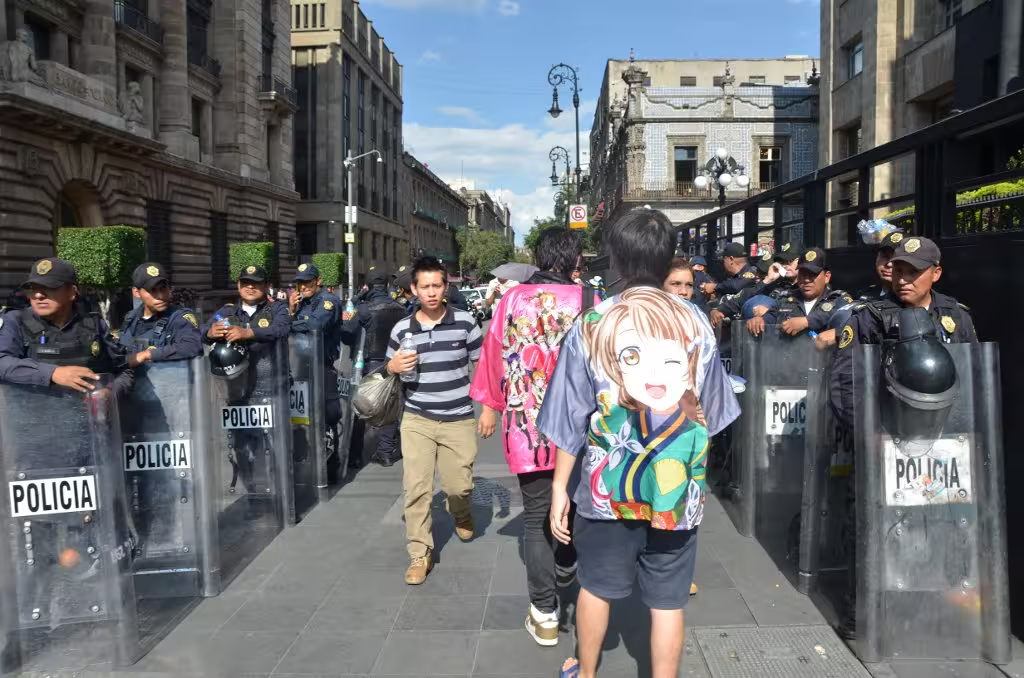
The Japanese are coddled, and it's quite significant when coming over from pretty much any other part of the world. Poverty is low-ish, drug epidemics are non-existent, issues of industrial pollution ceased decades ago, violent crime is low, and the country is (on its surface) problem-free. Thanks to provisions in the constitution the closest the JSDF has gotten to war is lounging in air-conditioned bases in Iraq, even more risk aversive than their Bundeswehr counterparts. Your average Russian consumes 18 liters of spirits a year, 67,000 Americans died from overdoses in 2018, 130 candidates and politicans in Mexico were murdered that same year, and Syria has grappled with international state-sponsored violence for the past 9 years. Yet Japan shrugs, the notion of a widespread social ill that doesn't involve work or aging seems impossibly foreign. As far as societal ills goes there's hikkis and overworking, both of which outside observers sort of scoff at as nebulous non-issues attributed solely to Japanese culture.
Yet the 40% of Japanese people not apathetic enough to abstain from voting live in this bubble of jingoistic paranoia, a perfect intersection with the permeating stink of exceptionalism that has cut across US politics for 70 years. For the anime-obsessed blogger, national power and strength are top priorities in a pacifist society that has yet to shake the spectres of its imperial past. All the while the economy has limped for 40 years, the same austerity-pushing political party has been in power for 65 years, and 40% of the labor pool consists of part-time workers and contractors. To me there's more pressing issues than big dick posturing.
The middle school-aged blog is a curious mish mash of entries, the most well-known being him handing out Lucky Star anime figures to North Korean children and Eromanga sensei t-shirts to the residents of Erromango. I wonder if all that international travel from Cuba to Mexico has dialated his worldview in the 12 years since that entry. it hasn't lol
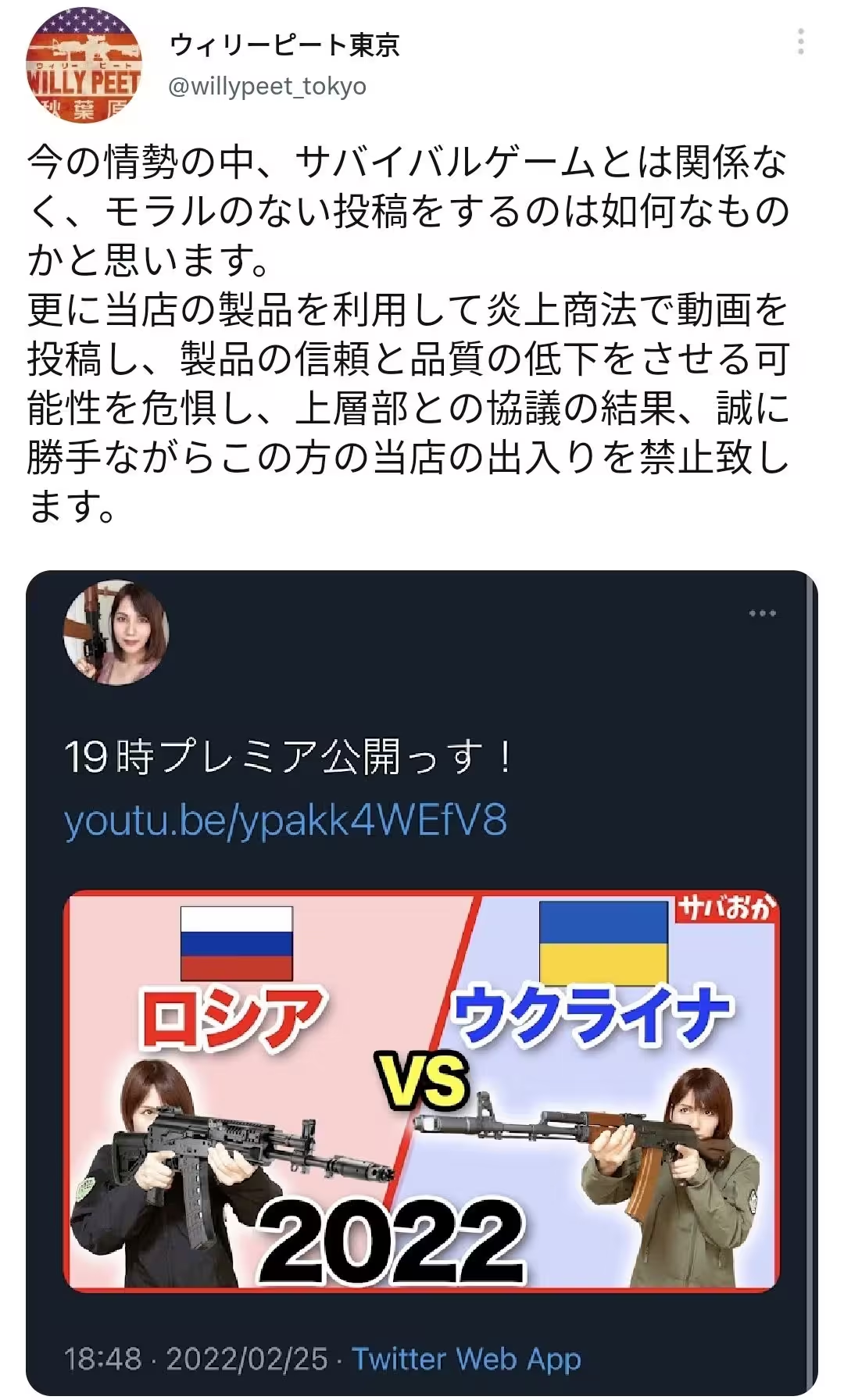 "Under these current events we find it objectionable to upload such morally vacant material that has no foundation in airsoft. After consulting with our upper management we have banned entry for this individual due to using our store's products to outrage farm, denigrating and eroding consumers' trust in the process."
"Under these current events we find it objectionable to upload such morally vacant material that has no foundation in airsoft. After consulting with our upper management we have banned entry for this individual due to using our store's products to outrage farm, denigrating and eroding consumers' trust in the process." 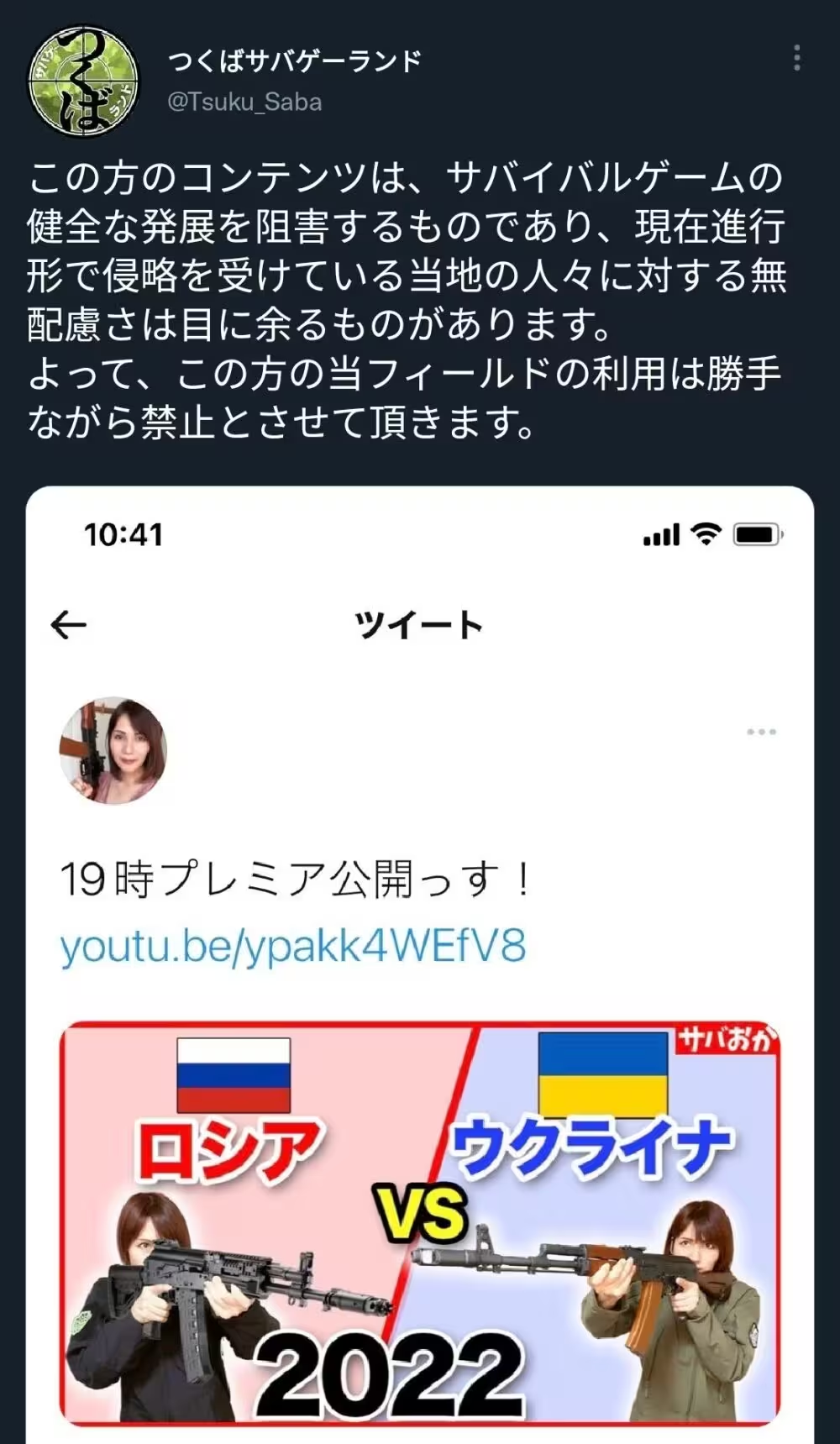 "This individual's harmful content impedes the development of airsoft, and is deeply inconsiderate to the people currently experiencing a military invasion. Due to these factors we have banned entry of this individual from our playfields."
"This individual's harmful content impedes the development of airsoft, and is deeply inconsiderate to the people currently experiencing a military invasion. Due to these factors we have banned entry of this individual from our playfields." Resignation to this lot in life was so deeply ingrained in the Breton people that it caused the hygienists to wonder whether these peasants would even consent to trade their diet or belongings for better ones if given the choice. The Breton accepts his fate as final and absolute, observed Villermé and Benoiston, quoting another contemporary observer to the fact that 'he treats his poverty like a hereditary and incurable disease.'
Aligning with a non-interventionist foreign policy much of Japan's international participation has been financial. Interest-free loans, technical assistance, and development packages for largely SEA and African nations have been the forefront agenda of the Japan International Cooperation Agency. Time and time again Nakamura Testu reiterated that Article 9 was responsible for his safety across decades of aid work in Afghanistan. Yet JICA's activites are another demonstration of the flexibility of a "pacifism" under the Japanese state's definitions. Lucrative post-war infrastructure ODA's in the Phillipines continued through Marcos Ferdinand's declaration of martial law in 1972. The Japanese government supported Suharto in his annexation of East Timor where 185,000 people with no ethnic, religious, or political ties to Indonesia were killed on behalf of a "common brotherhood." As recently as 2022 monetary aid and military training was given to a post-coup Tatmadaw, the organization that has induced 7 continuous decades of civil war in Myanmar.
Additionally the culture of the IJA didn't disappear in 1945, even overseas - most overtly the Korean army inherited their legacy. Signed regimental battle flags were carried in the Korean war, still written in hanja with phrases like "Bushido Spirit" only with a taegeuk instead of a hinomaru. In Vietnam they picked up a reputation for brutality against civilians. Post-war mandatory service is still analgous with a deeply rooted culture of hazing and sexual abuse.
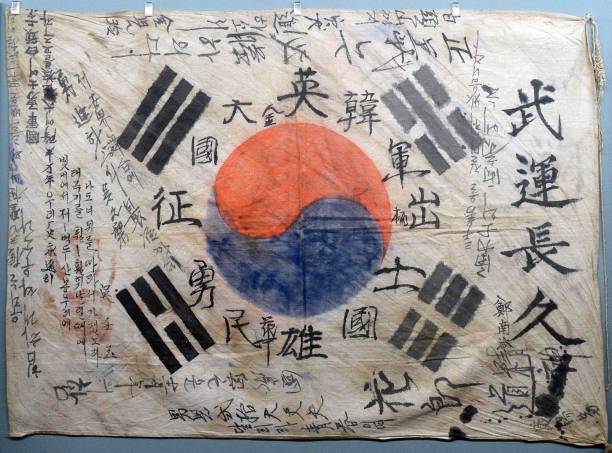
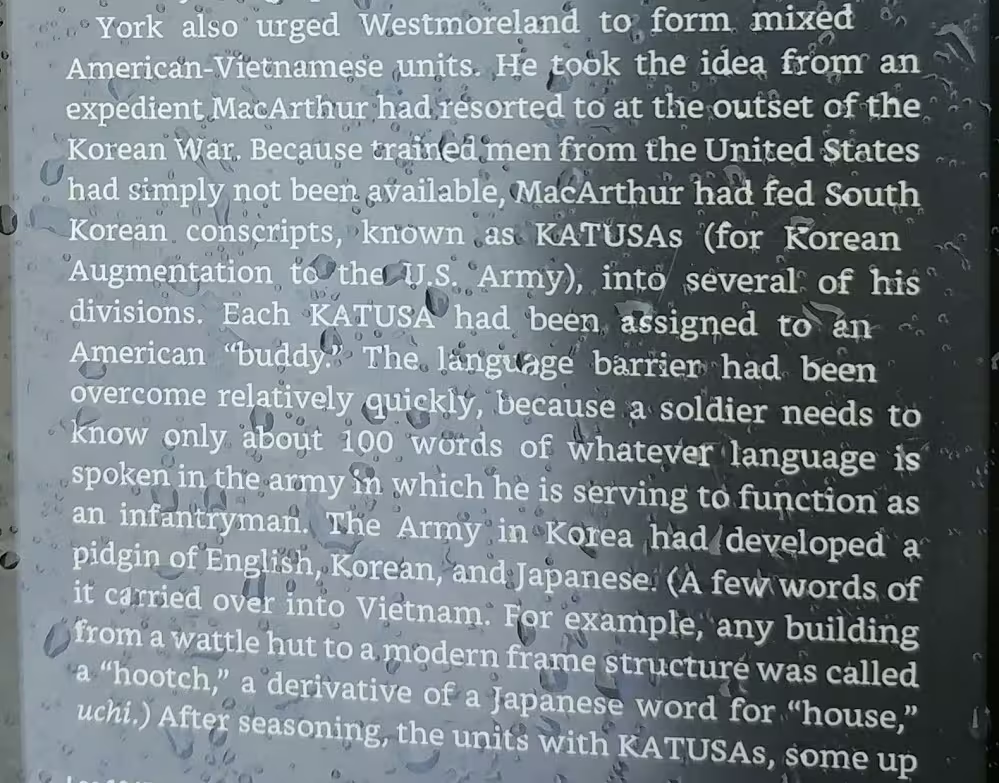
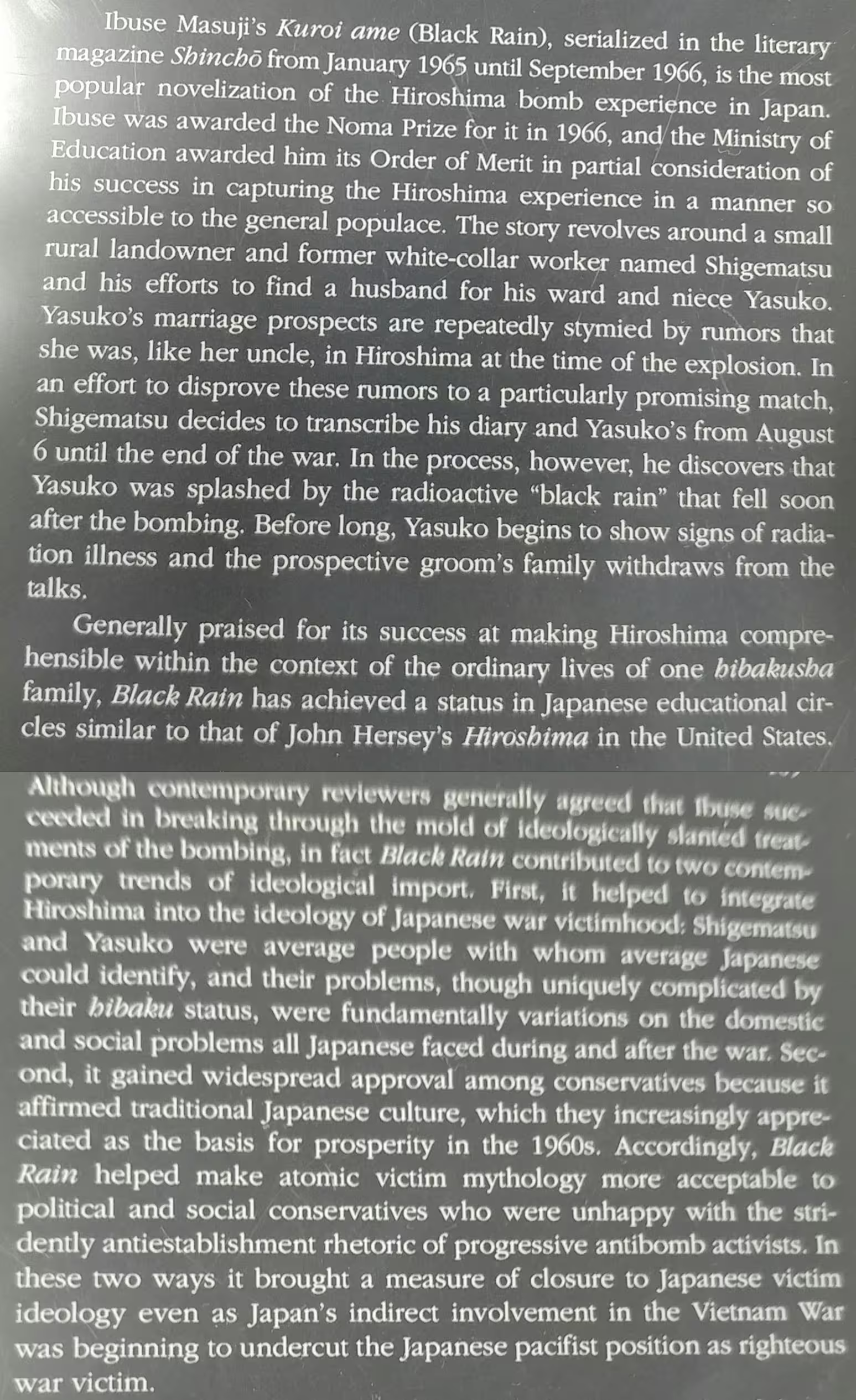
Several months after the Gulf War had formally ended, a literary critic named Matsumoto Kenichi wrote an article for the Tokyo Shimbun in which he compared Saddam’s invasion of Kuwait to the Japanese raid on Pearl Harbor. It was the counterpart, in a way, to Enzensberger’s comparison of Saddam and Hitler in Der Spiegel. Saddam’s claim, wrote Matsumoto, that he was fighting for Pan-Arab ideals “eerily echoed the Japanese militarists who, on the eve of Pearl Harbor, arrogantly proclaimed that ‘Asia is one.’” Both Iraq and Japan fought “holy wars” against Western imperialism. But the parallel, in Matsumoto’s opinion, went further: “Japan and Iraq went to war for virtually identical reasons.” Western powers were accused of making war inevitable, by depriving those countries of trade and raw materials. Thus war for Japan and Iraq had supposedly become a matter of survival. “Japan,” wrote Matsumoto, “has not atoned for its wartime atrocities. So we can’t accuse the Iraqis of using inhuman methods and violating international law without pointing a finger at ourselves.”
Ultimately blame lies on the Japanese. Although tumultuous post-war Japanese leaders never pressed the limits of American support, there were no equivalents to Gwangju or the 228 incident. (although there is a certain enjoyment to the "Liberal Democratic Party" being filled with proper fascists) The catalyst to Nobusuke Kishi's downfall was just one Tokyo University protester's death. Unlike Koreans, Taiwanese, Fillipinos, they never had to bleed in industrial quantities for post-war democratization. No systematic massacres of political opposition as in Indonesia, no narcopolitics like Myanmar, no islamist insurgencies like the Phillipines, no post-war race riots like Singapore. Like former Soviet Union states the japanese love to moan about the torrent of bad economic forecasts and static realities in the same vein as complaining about the weather. Unlike Russians or Albanians they have free elections. They'll stomach bleak financial forecasts, spiking VAT, burdensome invoice laws, and Nichigin measures that continue to crush small businesses - anything but voting. The Thai reverence for monarchy or the American desire to dish out opinions on anything is embarrassing but they're all no match for the "civility" deflection among the Japanese. Anything written off as public criticism, no matter when directed up or down, is instantly discarded among those who have never seen British television calling politicians child predator-adjacent.
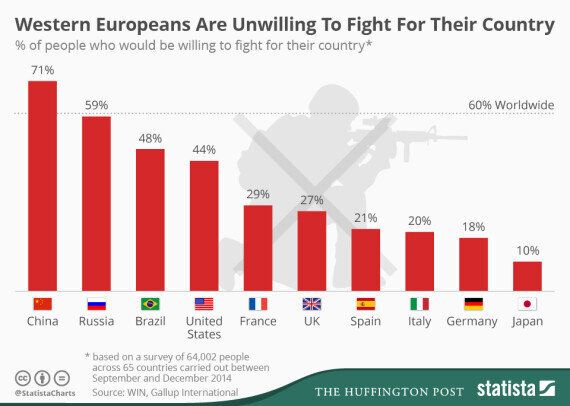
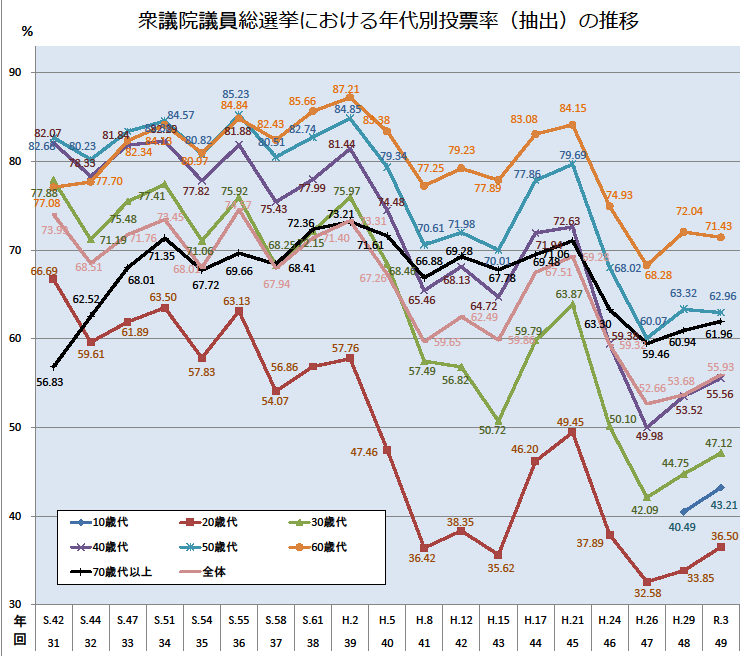
Despite consisting of the lowest slice of political engagement voters in their twenties unanimously vote for the LDP. Of course they believe someone else will do their bidding the percentage of young people actually willing to fight for their country is among the lowest in the world. Today the JGSDF is a desperate tramp, trying to appease a more "normal" demographic for recruitment when its public perception has long been tainted with gang members and Tate no Kai adherents. And even then relations between poor men from large countryside families and bougie idealistic literature otaku were never great, evidenced by the heckling during Yukio Mishima's coup d'etat speech at Camp Ichigaya.
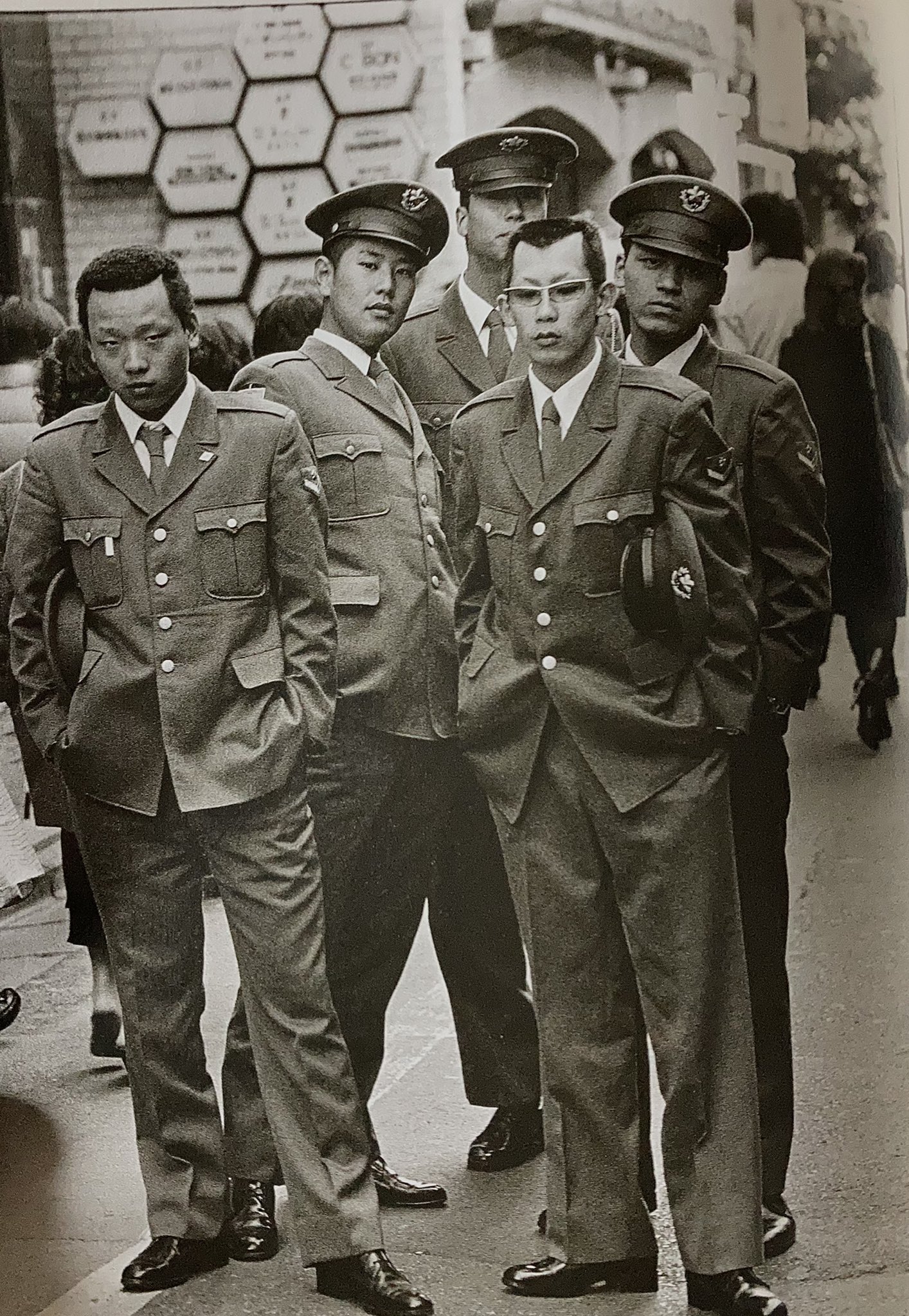 JGSDF, Harajuku. 1980. Jōji Hashiguchi
JGSDF, Harajuku. 1980. Jōji Hashiguchi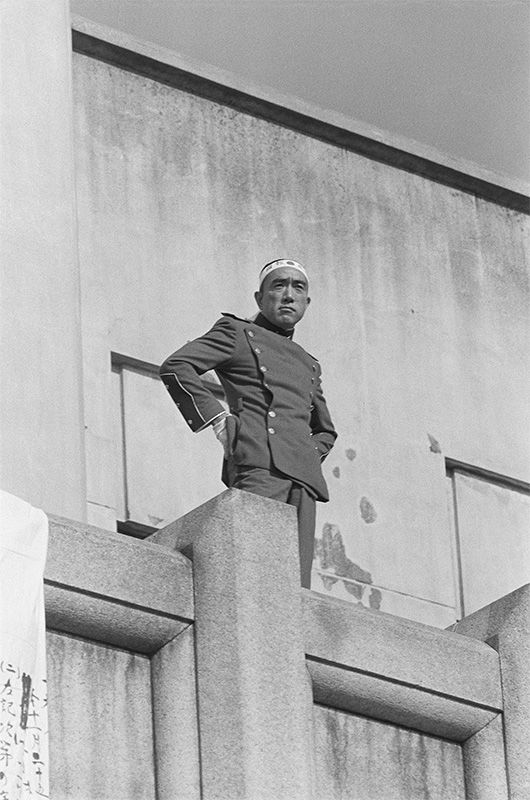 Mishima Incident
Mishima IncidentThe 30% of people who actually vote largely carry the underlying belief that failed diplomacy is an inevitability with irrational state actors like Russia, China, and North Korea who can only communicate through state power. It's not a difficult worldview to imagine with recent events and the constant headline stoking of ICBM tests. When the only proximate adversity most Japanese nationals face is people taking too long at the cash register, then war seems like a pragmatic abstract choice. Unlike the feverishly anti-war over 60's they never experienced near-famine, marxist riots, or deportation sentences to warzones. They are aching for a domestic Nork missile strike because it would satiate their preamble of victimhood, the ability to cast aside the past and proclaim that war is good, actually.
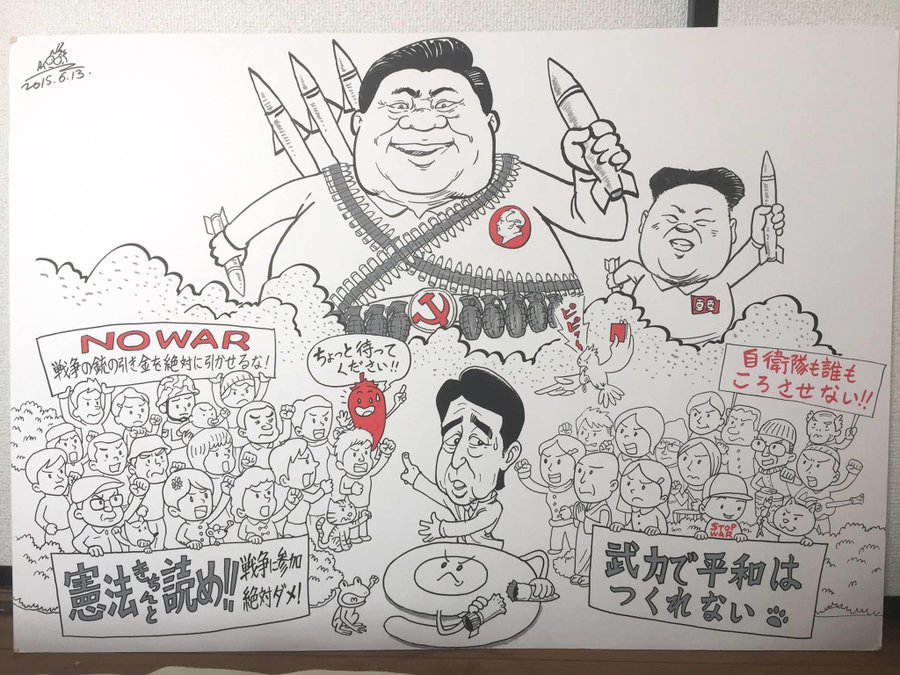
Oda Makoto, the father of the anti-Vietnam War movement in Japan and the author of a novel about the bombing of Hiroshima, told me that Japan had to remain a pacifist nation: “Japan, of all nations, must be a conscientious objector.” As a military power, Oda said, Japan would be a very dangerous country.Oda was born in 1932. He remembered how proud he had been, waving his Rising Sun flag after great military victories against the Americans. He could also remember, with particular bitterness, how his native city, Osaka, was bombed a day before the Japanese emperor announced on the radio that the war “had not developed in a way necessarily to Japan’s advantage” and that it was time to surrender. Oda did not cry, he said. His real bitterness concerned the way in which the Americans after the war wrecked Japan’s chances to break away from the past. It was the Americans who allowed the emperor to remain on his throne. It was the Americans who allowed the same bureaucrats and politicians who had led Japan into the war to continue ruling the country. It was the Americans who made the Japanese undermine their own constitution by building a new army, and it was the Americans who made the Japanese into accomplices of U.S. imperialism in Asia.
His resentment was not without justification, but Oda’s ambivalence toward the West was more complicated than political disillusion. It was an ambivalence bordering on hostility. This might have been partly a matter of age. He had been educated, after all, to despise the “Anglo-American demons.” And Pan-Asian propaganda was not all that far removed from romantic Third Worldism. But despite Oda’s Third Worldist views, his identification with the oppressed was not straightforward either. He also identified with the oppressors. One of the aims of his “Peace for Vietnam” movement had been to help American deserters and antiwar protesters. In Oda’s view, the American GIs, like the Japanese Imperial Army soldiers before, were aggressors as well as victims; aggressors because they killed innocent people, victims because they were forced to do so.
